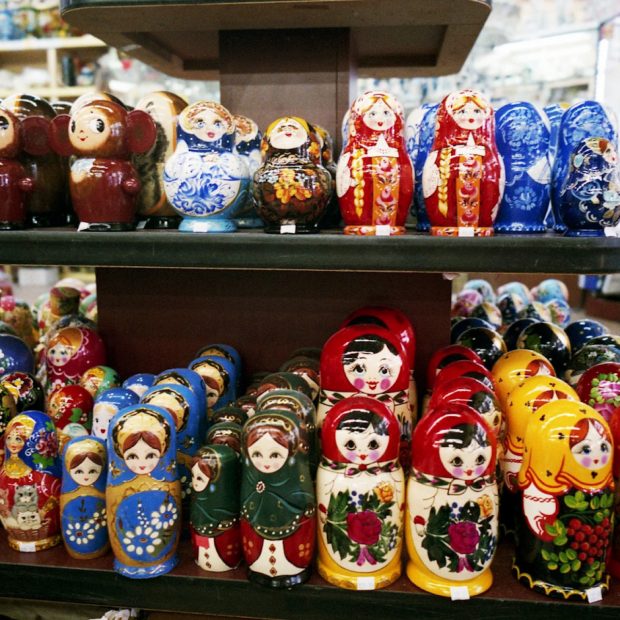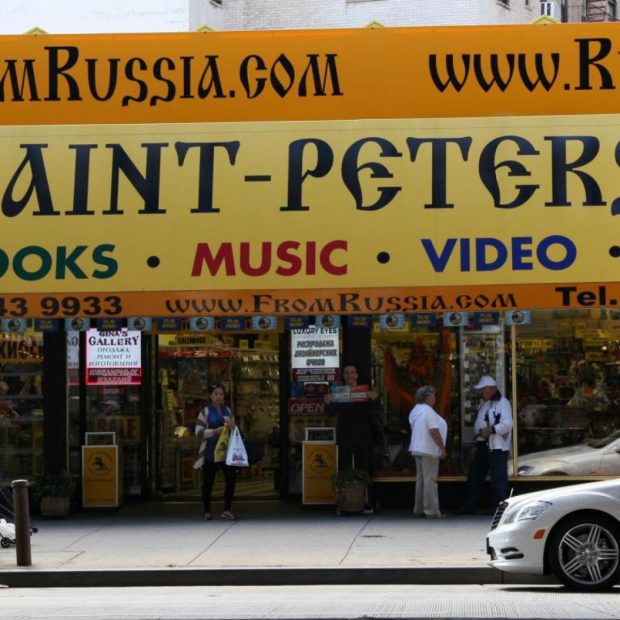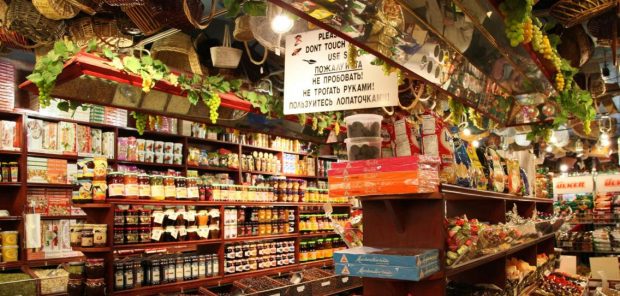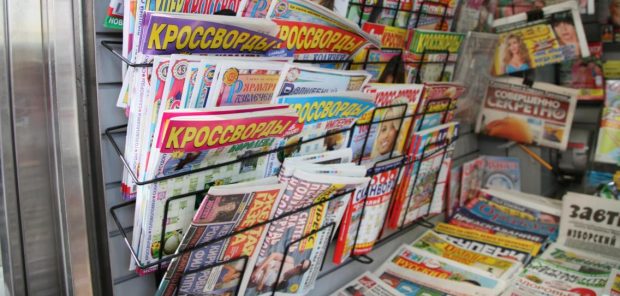
New York is the place of residence of many Ukrainians, Crimeans, and Russians. Vladimir Putin interests people here little, the Ukraine crisis is far away. Visit a parallel company.
The Ukrainian Museum of New York is located on Second Avenue. No other visitor got lost here, the friendly older lady behind the cashier speaks only broken English. She points to colorful easter eggs on the ground floor. “Everything hand-colored!”, She says so proudly as if she had swept the brush at most. No word about the transparent of the “EuroMaidan”, which adorn the staircase: colorful slogans in Cyrillic font from the time when the protest was still peaceful, when in Odessa, no policeman, while people burned in a building.
READ: Back to Our Roots: New York “Food Forest”

“St. Petersburg” is the name of the business in the New York community “Little Odessa”. Especially many Jews from Russia have settled here.
Source: Picture Alliance / Abaca
The more interesting exhibition is a stick deeper, in the basement – as if symbolically suggested that a part of the story is displaced, depressed into the collective unconscious. It is an exhibition about Crimea.
While Russian troops occupied Crimea, some people pointed out, this part of Ukraine has always belonged to Russia until Nikita Khrushchev gave him away in 1954. But the reality is more complicated, tragic because since the 15th century Crimea has had neither Ukrainian nor Russians, but Tatars – a closely related to the Turks Muslim people.
READ: Real New Yorkers: How Do They Live?
In 1944 Stalin and his intelligence chief Lawrenti Beria sent the crude rogues to the big trip. They would have said, collectively collaborated with the Germans, this is the punishment. Most of the Tatars were deported to Uzbekistan, overall, more than 250,000 people should have been deported by Crimea.

The district is located in Brooklyn – a community in which there are specialties from Russia and Ukraine.
Source: Picture Alliance / Abaca
No one knows how many have died on the way: a quarter or a third? Anyway, they could not go back afterward. Under Stalin not, under Khrushchev not – not even after his famous speech in front of the XX. Congress of the KPDSU, where he said the quarter-truth about Stalin’s crimes – in Breschnev not even, but not under Gorbachev. First, the Soviet Union had to break apart before the descendants of the deported return was possible.
The exhibition on Second Avenue shows men with fur hats and tremendous matting, women with and without a headscarf. And all say the same thing: “We have no other home. This is the only place for us. “15 percent of the population of Crimea, so appreciate some, today Tatars. The fewest of them are likely to have welcomed the Russian invasion because the Ukrainians had promised them cultural autonomy. Putin will not grant you to you under warranty.
The place where Ukrainians gather in New York is not the museum at Second Avenue. It is the “Café Vaselka”, three streets continue to the north. Since 1954, there are reliable Ukrainian dishes on the menu: Wareniki, steam-filled dough pockets, and Holubzi, cabbage rollers full of Kasha, so buckwheat green, served in a brown mushroom sauce.

Cyrillic font on the magazine coves – in some shops in “Little Odessa” is sold Ukrainian and Russian magazines.
Source: Picture Alliance / Abaca
Unfortunately, the waitresses have their hands full to do, so no time for a conversation about politics. The “Café Vaselka” runs well, like any of these institutions in which metaphysical suffering with material resources (namely gastronomic) is fought. After all, the Wareniki and Holubzi still taste excellent well here; Putin out or her.
The district, which is usually called “Little Odessa”, is very different than the residential area of the Ukrainian, namely next to the amusement park of Coney Island at the foot of Brooklyn. Officially called “Little Odessa” Brighton Beach, and most inhabitants are not Ukrainians, but Russians, more precisely, Jews. Many old people, many survivors of the Holocaust. However, most of these Jews are then very Russian again.
Once – in a terribly icy January – a young man with Kippa went on a golden chain a David star of enormous dimensions around his neck, through a street of the neighborhood; Behind him, he dragged a fir tree to the Orthodox Christfest.
The first thing that stands out when Brighton Beach rises from the Q-Train are the Cyrillic letters: “Apteka” can decipher the traveler and “Moskva Video”. A lady babbling in the language Pushkins in your iPhone, in the grocery store you will find Tworog (Quark), Kwas (Malzbier) and Tkemali (Sharp-acid plum sauce from Georgia) and Koschere Kasha in a Hebrew labeled packaging right next to fat glossy pork sausages.
READ: Flying Cup: Here You Find Everything about the Flying Cup in Dubai
In “Little Odessa” the last section of Louis Malles still plays attractive documentary “… and the Pursuit of Happiness” (1986): The French filmmaker had been invited to a family celebration in a restaurant and began with his camera a beautiful dark-skinned Singer from New Jersey, who fervently smashed Russian songs into the microphone. Inverse assimilation, if you want. Since then, “Little Odessa” has not changed in the core.
This is a parallel company, as many are so many in New York. And no one had wanted to talk about Putin with a reporter running. “These are not my worries,” said the young saleswoman in the bookstore “St. Petersburg “, where Russian CDs and DVDs are also offered.
In the pile of bestsellers a cover with screaming colors: skyscrapers, cars, people, and in the middle of a huge gray smoke mushroom, an atomex explosion. The Babushka before the bookstore on the street can not be English, but she understood the name “Putin” and waved with the expression of the Abscheus on his face.
For a short statement, only a small, stocky man is ready, the Boris is called his surname, he does not want to call: “I am with my parents 30 years ago,” he said, “What’s the nonsense about there?” Then he added, “My home is here.”
Like us on Facebook for more stories like this: